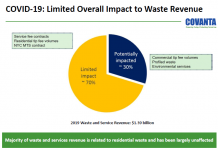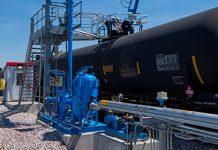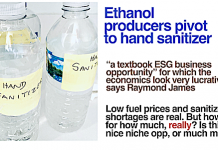by Debra Fiakas CFA
Ethanol producer Green Plains Renewable Energy, Inc. (GPRE: Nasdaq) announced today plans to build a fuel terminal point in Beaumont, Texas. The terminal will be located at a facility owned by Green Plains’ partner in the venture, Jefferson Gulf Coast Energy Partners. It will be helpful to have a friend in the project that is expected to cost $55 million to complete just ethanol storage and throughput capacity. Planned storage capacity is equivalent to 500,000 barrels, with the potential to expand to 1.0 million barrels. Capacity to handle biofuels or other hydrocarbon fuels will be added later. The terminal should give Green Plains better access to world fuel markets through railroad, barge and ocean tankers connections at the terminal.
This is the second terminal project for Green Plains. In November 2015, the company announced plans to build an ethanol terminal in Maumelle, Arkansas for access to the Union Pacific rail line. The terminal will have the capacity to unload trains as long as 110 cars in one day and will be able to store as much as 4.2 million gallons of ethanol. The price tag is projected to be $12 million, which will be split equally between Green Plains and a partner, Delek US Holdings. A downstream refining and distribution company, Delek is experienced in fuel logistics and has connections to convenience stores.
The two projects should smooth the way for Green Plains to economically reach customers both in the U.S. and around the world. Lower cost distribution can also give Green Plains a competitive edge in striking deals. Now the company needs to ‘fill the pipe,’ so to speak. The altered strategic plans of some competing ethanol producers may be giving Green Plains an opportunity to do just that.
Abengoa SA (ABG: Madrid or ABGB: Nasdaq) has debt issues back home and is putting its U.S. operation into bankruptcy. Green Plains has offered $200 million in cash for Abengoa’s ethanol plants in Illinois and Indiana. The deal will give Green Plains another 180 million gallons in production capacity and elevate it from fourth to third largest ethanol producer in the U.S., passing up Valero Energy (VLO: NYSE).
Even top-dog Archer Daniels Midland (ADM: NYSE), with its 1.7 billion gallon ethanol production capacity, is rethinking its ethanol priorities. In February 2016, ADM announced its two dry mill ethanol plants that grind and crush corn feedstock were under scrutiny. At that time ethanol prices had slumped to the $1.34 to $1.40 range and renewable fuels policy seemed unclear. Since then the profit potential in ethanol has improved as prices have come back to the $1.65 to $1.70 price range. ADM may ‘think’ its strategy right back to the starting point. In the meantime, Green Plains management can still speculate about grabbing up even more capacity.
Acquiring production capacity during a market downturn, is a tactic well known by number two ethanol supplier Poet, LLC (private). Based in Sioux Falls, SD, Poet has a long history of buying up bankrupt and otherwise beleaguered ethanol producers and then installing its own proprietary technologies to improve efficiency. Poet itself might have an interest in ADM’s dry mill plants if either or both of them get put up on the auction block. Poet has patented its proprietary dry mill process and is the largest ethanol producer in the country in terms of dry mill plant capacity.
Green Plains ambitions may be tempered by the condition of its balance sheet. The company has not shied away from debt to finance its expansion in the ethanol sector. At the end of March 2016, long-term debt and notes totaled $765.9 million, representing an 82.4% debt-to-equity ratio. A look at assets helps put leverage into clear focus. Book value of property, plant and equipment assets net of accumulated depreciation was $920.5 million in March 2016, representing a multiple of 1.2 times debt obligations. A current ratio of 2.10 should also provide some comfort to shareholders and creditors.
The company had $383.4 million in cash on the balance sheet at the end of the last quarter, suggesting nice little treasure trove. Unfortunately, during the period of weakened ethanol prices in late 2015 and early 2016, Green Plains was using cash to support operations – $259 million in the twelve months ending March 2016. In my view, a company generating nearly $3.0 billion in annual sales needs as much as $450 million to $600 million in cash just for working capital purposes. This is especially important when at the trough of the business cycle and profits have been reduced. Against this ruler the treasure trove is more like a bare bones reserve.
Green Plains will need to come up with $33.5 million to support commitments to the two terminal joint ventures. Then there is the $200 million bid for the Abengoa assets. The company has some alternatives. Green Plains Partners, LP (GPP: NYSE), the holder of the company’s downstream assets, could use some of the $49 million in remaining credit on a revolving line of credit facility opened in 2015. The parent company has a revolving line of credit as well. However, to be meaningful in the current investment scenario, the company would need to petition the agent to exercise the $75.0 million accordion feature that was built into the facility. Of course, new common stock could be issued through either the parent (GPRE) or the downstream limited partnership (GPP). GPRE current commands a multiple of 13.5 times projected earnings, while GPP is trading at 8.3 times expected earnings in 2017.
Debra Fiakas is the Managing Director of Crystal Equity Research, an alternative research resource on small capitalization companies in selected industries.
Neither the author of the Small Cap Strategist web log, Crystal Equity Research nor its affiliates have a beneficial interest in the companies mentioned herein.








